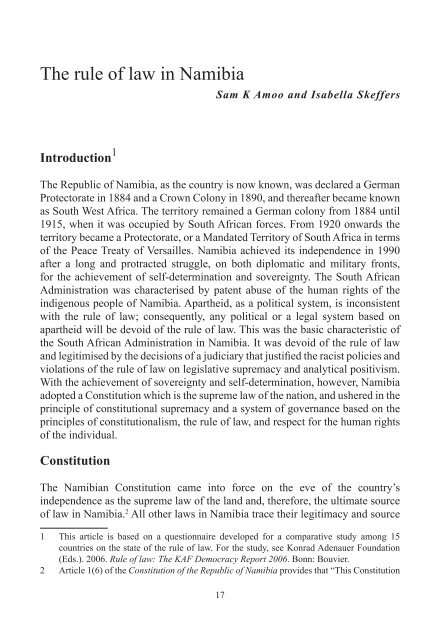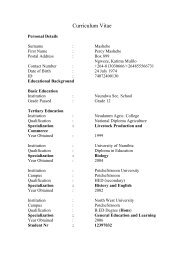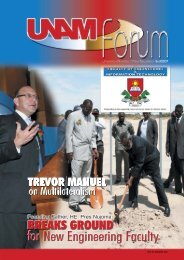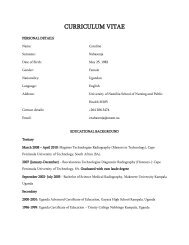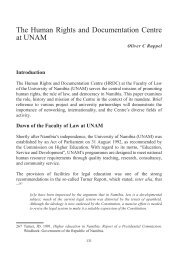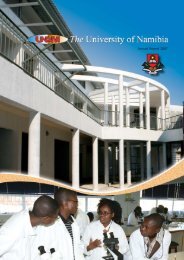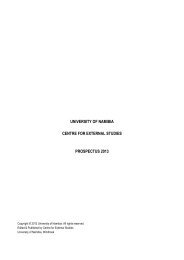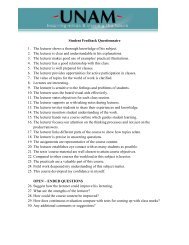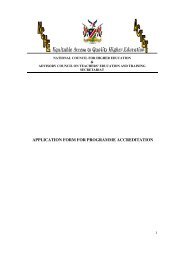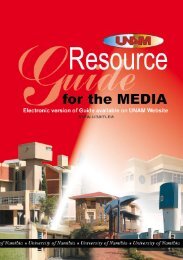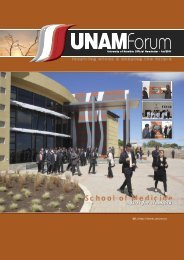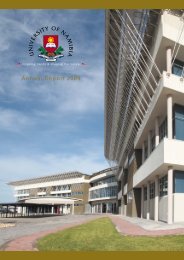Human Rights and the Rule of Law in Namibia - University of Namibia
Human Rights and the Rule of Law in Namibia - University of Namibia
Human Rights and the Rule of Law in Namibia - University of Namibia
Create successful ePaper yourself
Turn your PDF publications into a flip-book with our unique Google optimized e-Paper software.
The rule <strong>of</strong> law <strong>in</strong> <strong>Namibia</strong><br />
Sam K Amoo <strong>and</strong> Isabella Skeffers<br />
Introduction <br />
The Republic <strong>of</strong> <strong>Namibia</strong>, as <strong>the</strong> country is now known, was declared a German<br />
Protectorate <strong>in</strong> 1884 <strong>and</strong> a Crown Colony <strong>in</strong> 1890, <strong>and</strong> <strong>the</strong>reafter became known<br />
as South West Africa. The territory rema<strong>in</strong>ed a German colony from 1884 until<br />
1915, when it was occupied by South African forces. From 1920 onwards <strong>the</strong><br />
territory became a Protectorate, or a M<strong>and</strong>ated Territory <strong>of</strong> South Africa <strong>in</strong> terms<br />
<strong>of</strong> <strong>the</strong> Peace Treaty <strong>of</strong> Versailles. <strong>Namibia</strong> achieved its <strong>in</strong>dependence <strong>in</strong> 1990<br />
after a long <strong>and</strong> protracted struggle, on both diplomatic <strong>and</strong> military fronts,<br />
for <strong>the</strong> achievement <strong>of</strong> self-determ<strong>in</strong>ation <strong>and</strong> sovereignty. The South African<br />
Adm<strong>in</strong>istration was characterised by patent abuse <strong>of</strong> <strong>the</strong> human rights <strong>of</strong> <strong>the</strong><br />
<strong>in</strong>digenous people <strong>of</strong> <strong>Namibia</strong>. Apar<strong>the</strong>id, as a political system, is <strong>in</strong>consistent<br />
with <strong>the</strong> rule <strong>of</strong> law; consequently, any political or a legal system based on<br />
apar<strong>the</strong>id will be devoid <strong>of</strong> <strong>the</strong> rule <strong>of</strong> law. This was <strong>the</strong> basic characteristic <strong>of</strong><br />
<strong>the</strong> South African Adm<strong>in</strong>istration <strong>in</strong> <strong>Namibia</strong>. It was devoid <strong>of</strong> <strong>the</strong> rule <strong>of</strong> law<br />
<strong>and</strong> legitimised by <strong>the</strong> decisions <strong>of</strong> a judiciary that justified <strong>the</strong> racist policies <strong>and</strong><br />
violations <strong>of</strong> <strong>the</strong> rule <strong>of</strong> law on legislative supremacy <strong>and</strong> analytical positivism.<br />
With <strong>the</strong> achievement <strong>of</strong> sovereignty <strong>and</strong> self-determ<strong>in</strong>ation, however, <strong>Namibia</strong><br />
adopted a Constitution which is <strong>the</strong> supreme law <strong>of</strong> <strong>the</strong> nation, <strong>and</strong> ushered <strong>in</strong> <strong>the</strong><br />
pr<strong>in</strong>ciple <strong>of</strong> constitutional supremacy <strong>and</strong> a system <strong>of</strong> governance based on <strong>the</strong><br />
pr<strong>in</strong>ciples <strong>of</strong> constitutionalism, <strong>the</strong> rule <strong>of</strong> law, <strong>and</strong> respect for <strong>the</strong> human rights<br />
<strong>of</strong> <strong>the</strong> <strong>in</strong>dividual.<br />
Constitution<br />
The <strong>Namibia</strong>n Constitution came <strong>in</strong>to force on <strong>the</strong> eve <strong>of</strong> <strong>the</strong> country’s<br />
<strong>in</strong>dependence as <strong>the</strong> supreme law <strong>of</strong> <strong>the</strong> l<strong>and</strong> <strong>and</strong>, <strong>the</strong>refore, <strong>the</strong> ultimate source<br />
<strong>of</strong> law <strong>in</strong> <strong>Namibia</strong>. All o<strong>the</strong>r laws <strong>in</strong> <strong>Namibia</strong> trace <strong>the</strong>ir legitimacy <strong>and</strong> source<br />
This article is based on a questionnaire developed for a comparative study among 15<br />
countries on <strong>the</strong> state <strong>of</strong> <strong>the</strong> rule <strong>of</strong> law. For <strong>the</strong> study, see Konrad Adenauer Foundation<br />
(Eds.). 2006. <strong>Rule</strong> <strong>of</strong> law: The KAF Democracy Report 2006. Bonn: Bouvier.<br />
Article 1(6) <strong>of</strong> <strong>the</strong> Constitution <strong>of</strong> <strong>the</strong> Republic <strong>of</strong> <strong>Namibia</strong> provides that “This Constitution<br />
17
The rule <strong>of</strong> law <strong>in</strong> <strong>Namibia</strong><br />
from <strong>the</strong> Constitution. In order to prevent <strong>the</strong> creation <strong>of</strong> a legal vacuum, Article<br />
140 <strong>of</strong> <strong>the</strong> Constitution logically provides that all laws <strong>in</strong> force immediately<br />
before <strong>the</strong> date <strong>of</strong> <strong>in</strong>dependence shall rema<strong>in</strong> <strong>in</strong> force until repealed or amended<br />
by Act <strong>of</strong> Parliament or until <strong>the</strong>y are declared unconstitutional by a competent<br />
court.<br />
<strong>Human</strong> rights<br />
The <strong>Namibia</strong>n Constitution is a product <strong>of</strong> a struggle for sovereignty <strong>and</strong> human<br />
rights. This is reflected <strong>in</strong> <strong>the</strong> first provision, which states that <strong>Namibia</strong> is a – <br />
… sovereign, secular, democratic <strong>and</strong> unitary state founded upon <strong>the</strong> pr<strong>in</strong>ciples <strong>of</strong><br />
democracy, <strong>the</strong> rule <strong>of</strong> law <strong>and</strong> justice for all.<br />
It creates, <strong>in</strong>ter alia, <strong>the</strong> three organs <strong>of</strong> state, namely <strong>the</strong> executive, <strong>the</strong> judiciary<br />
<strong>and</strong> <strong>the</strong> legislature; establishes <strong>the</strong> various service commissions; <strong>and</strong> def<strong>in</strong>es<br />
state responsibility to obligations, succession to treaties, <strong>and</strong> <strong>the</strong> status <strong>of</strong><br />
<strong>in</strong>ternational law. The Constitution also conta<strong>in</strong>s a Bill <strong>of</strong> <strong>Rights</strong> that outl<strong>in</strong>es<br />
fundamental human rights <strong>and</strong> freedoms, <strong>in</strong>clud<strong>in</strong>g <strong>the</strong> right to adm<strong>in</strong>istrative<br />
justice. These rights <strong>and</strong> freedoms are protected <strong>and</strong> entrenched under relevant<br />
general provisions. The Constitution does not precisely def<strong>in</strong>e <strong>the</strong> difference<br />
between rights <strong>and</strong> freedoms, but it may be argued that <strong>the</strong> difference lies <strong>in</strong> <strong>the</strong><br />
extent <strong>of</strong> permissive derogation.<br />
Under Article 131 <strong>of</strong> <strong>the</strong> Constitution, <strong>the</strong> rights <strong>and</strong> freedoms conta<strong>in</strong>ed <strong>in</strong> Chapter<br />
3 are entrenched, <strong>and</strong> <strong>the</strong> provisions may not be repealed or amended <strong>in</strong>s<strong>of</strong>ar as<br />
such repeal or amendment detracts or dim<strong>in</strong>ishes from such rights <strong>and</strong> freedoms.<br />
The rights conta<strong>in</strong>ed <strong>in</strong> Chapter 3 <strong>in</strong>clude protection <strong>of</strong> life; protection <strong>of</strong> liberty;<br />
respect for human dignity; abolition <strong>of</strong> slavery or forced labour; equality <strong>and</strong><br />
freedom from discrim<strong>in</strong>ation, arbitrary arrest <strong>and</strong> detention; access to a fair trial;<br />
<strong>the</strong> guarantee<strong>in</strong>g <strong>of</strong> privacy <strong>and</strong> respect for family; <strong>the</strong> rights <strong>of</strong> children; <strong>the</strong><br />
right to acquire property; <strong>the</strong> right to political activity; <strong>the</strong> right to adm<strong>in</strong>istrative<br />
justice, culture, <strong>and</strong> education. The fundamental freedoms conta<strong>in</strong>ed <strong>in</strong> Chapter<br />
3 <strong>in</strong>clude freedom <strong>of</strong> speech <strong>and</strong> expression; freedom <strong>of</strong> thought, conscience <strong>and</strong><br />
belief; freedom <strong>of</strong> religion; freedom to assemble peaceably <strong>and</strong> without arms;<br />
<br />
<br />
shall be <strong>the</strong> Supreme <strong>Law</strong> <strong>of</strong> <strong>Namibia</strong>”.<br />
Article 1(1), The Constitution <strong>of</strong> <strong>the</strong> Republic <strong>of</strong> <strong>Namibia</strong>.<br />
See Articles 5 <strong>and</strong> 131, The Constitution <strong>of</strong> <strong>the</strong> Republic <strong>of</strong> <strong>Namibia</strong>.<br />
18
The rule <strong>of</strong> law <strong>in</strong> <strong>Namibia</strong><br />
freedom <strong>of</strong> association; freedom to withhold labour; freedom to move freely<br />
throughout <strong>Namibia</strong>; freedom to reside <strong>and</strong> settle <strong>in</strong> any part <strong>of</strong> <strong>Namibia</strong>;<br />
freedom to leave <strong>and</strong> return to <strong>Namibia</strong>; <strong>and</strong> freedom to practise any pr<strong>of</strong>ession,<br />
or carry on any occupation, trade or bus<strong>in</strong>ess. The <strong>Namibia</strong>n courts have h<strong>and</strong>ed<br />
down a number <strong>of</strong> cases uphold<strong>in</strong>g <strong>the</strong> rights <strong>of</strong> <strong>in</strong>dividuals under <strong>the</strong> Bill <strong>of</strong><br />
<strong>Rights</strong>, <strong>in</strong>clud<strong>in</strong>g <strong>the</strong> rights <strong>of</strong> persons with HIV/AIDS <strong>and</strong> <strong>the</strong> right <strong>of</strong> accused<br />
persons to legal representation provided by <strong>the</strong> state. Under Article 25, <strong>the</strong> courts<br />
are given <strong>the</strong> power to declare <strong>in</strong>valid any law or any action <strong>of</strong> <strong>the</strong> executive<br />
<strong>and</strong> agencies <strong>of</strong> <strong>the</strong> government that is <strong>in</strong>consistent with <strong>the</strong> provisions <strong>of</strong><br />
Chapter 3.<br />
However, <strong>the</strong> Constitution does draw a dist<strong>in</strong>ction between rights <strong>and</strong> freedoms.<br />
With regard to <strong>the</strong> latter, Article 21(2) , for example, provides that <strong>the</strong>y –<br />
… shall be exercised subject to <strong>the</strong> law <strong>of</strong> <strong>Namibia</strong>, <strong>in</strong> so far as such law imposes<br />
reasonable restrictions on <strong>the</strong> exercise <strong>of</strong> <strong>the</strong> rights <strong>and</strong> freedoms conferred by <strong>the</strong><br />
said Sub-Article, which are necessary <strong>in</strong> a democratic society <strong>and</strong> are required <strong>in</strong> <strong>the</strong><br />
<strong>in</strong>terests <strong>of</strong> <strong>the</strong> sovereignty <strong>and</strong> <strong>in</strong>tegrity <strong>of</strong> <strong>Namibia</strong>, national security, public order,<br />
decency or morality, or <strong>in</strong> relation to contempt <strong>of</strong> court, defamation or <strong>in</strong>citement to<br />
an <strong>of</strong>fence.<br />
These permissible restrictions under specific Articles <strong>of</strong> <strong>the</strong> Constitution, toge<strong>the</strong>r<br />
with <strong>the</strong> general nature <strong>of</strong> <strong>the</strong> provisions <strong>of</strong> a constitution, prima facie, require<br />
<strong>the</strong> exercise <strong>of</strong> <strong>the</strong> constitutional jurisdiction <strong>of</strong> <strong>the</strong> courts <strong>in</strong> <strong>in</strong>terpret<strong>in</strong>g <strong>the</strong> grey<br />
areas <strong>of</strong> <strong>the</strong> Constitution, as to what constitutes decency or morality, for example.<br />
S<strong>in</strong>ce <strong>Namibia</strong>’s <strong>in</strong>dependence, <strong>the</strong> courts have been called upon to <strong>in</strong>terpret<br />
similar provisions <strong>of</strong> <strong>the</strong> Constitution <strong>and</strong> have adopted what may, to borrow<br />
John Dugard’s expression, be termed “a natural law cum realist or a purposive<br />
approach”, <strong>and</strong> have developed a particular jurisprudence based on <strong>the</strong> values<br />
<strong>of</strong> <strong>the</strong> <strong>Namibia</strong>n people. These cases are concerned with <strong>the</strong> determ<strong>in</strong>ation <strong>of</strong><br />
N<strong>and</strong>itume v M<strong>in</strong>ister <strong>of</strong> Defence 2000 NR 103.<br />
Government <strong>of</strong> <strong>the</strong> Republic <strong>of</strong> <strong>Namibia</strong> & O<strong>the</strong>rs v Ge<strong>of</strong>rey Kupuzo Mwilima & O<strong>the</strong>rs,<br />
Supreme Court Case No. SA 29/2001.<br />
Article 21 provides for <strong>the</strong> freedom <strong>of</strong> speech <strong>and</strong> expression, thought, religion, association,<br />
etc.<br />
Dugard, J. 1971. “The judicial process, positivism <strong>and</strong> civil liberty”. South African <strong>Law</strong><br />
Journal 88:181–200.<br />
19
The rule <strong>of</strong> law <strong>in</strong> <strong>Namibia</strong><br />
<strong>the</strong> constitutionality <strong>of</strong> legislative provisions or practices relat<strong>in</strong>g to corporal<br />
punishment, <strong>the</strong> restra<strong>in</strong><strong>in</strong>g <strong>of</strong> prisoners by cha<strong>in</strong><strong>in</strong>g <strong>the</strong>m to each o<strong>the</strong>r by<br />
means <strong>of</strong> metal cha<strong>in</strong>s, 10 <strong>and</strong> homosexual relationships. 11<br />
For example, <strong>the</strong> provisions <strong>of</strong> Articles 21(2) <strong>and</strong> 22 <strong>of</strong> <strong>the</strong> Constitution allow<br />
for derogation from <strong>the</strong> stated freedoms on specific grounds. A case <strong>in</strong> po<strong>in</strong>t is<br />
Kauesa v M<strong>in</strong>ister <strong>of</strong> Home Affairs & O<strong>the</strong>rs, 12 where <strong>the</strong> court had to rule on<br />
<strong>the</strong> constitutionality <strong>of</strong> Regulation 58(32) <strong>of</strong> <strong>the</strong> Police Regulations deemed to<br />
have been made under <strong>the</strong> <strong>Namibia</strong>n Police Act, 1990 (No. 19 <strong>of</strong> 1990), which<br />
prohibited a member <strong>of</strong> <strong>the</strong> <strong>Namibia</strong>n Police from comment<strong>in</strong>g unfavourably <strong>in</strong><br />
public on <strong>the</strong> adm<strong>in</strong>istration <strong>of</strong> <strong>the</strong> <strong>Namibia</strong>n Police or any o<strong>the</strong>r government<br />
department <strong>and</strong> rendered such conduct an <strong>of</strong>fence.<br />
The central issue to be determ<strong>in</strong>ed was whe<strong>the</strong>r Regulation 58(32) constituted<br />
a permissible restriction on <strong>the</strong> right to freedom <strong>of</strong> speech <strong>of</strong> a serv<strong>in</strong>g member<br />
<strong>of</strong> <strong>the</strong> <strong>Namibia</strong>n Police Force. Article 21(1)(a) <strong>of</strong> <strong>the</strong> <strong>Namibia</strong>n Constitution<br />
provides that –<br />
… all persons shall have <strong>the</strong> right to freedom <strong>of</strong> speech <strong>and</strong> expression.<br />
A limitation on such right could only be permissible if it fell with<strong>in</strong> <strong>the</strong> terms <strong>of</strong><br />
Article 21(2) which provides that –<br />
The fundamental freedoms … shall be exercised subject to <strong>the</strong> law <strong>of</strong> <strong>Namibia</strong>, <strong>in</strong> so far<br />
as such law imposes reasonable restrictions on <strong>the</strong> exercise <strong>of</strong> such rights <strong>and</strong> freedoms<br />
…, which are necessary <strong>in</strong> a democratic society <strong>and</strong> are required <strong>in</strong> <strong>the</strong> <strong>in</strong>terests <strong>of</strong><br />
<strong>the</strong> sovereignty <strong>and</strong> <strong>in</strong>tegrity <strong>of</strong> <strong>Namibia</strong>, national security, public order, decency or<br />
morality, or <strong>in</strong> relation to contempt <strong>of</strong> court, defamation or <strong>in</strong>citement to an <strong>of</strong>fence.<br />
See Ex Parte Attorney-General, <strong>Namibia</strong>: <strong>in</strong> re Corporal Punishment by Organs <strong>of</strong> State<br />
1991(3) SA 76 (NmS).<br />
10 See Namunjepo & O<strong>the</strong>rs v Comm<strong>and</strong><strong>in</strong>g Officer, W<strong>in</strong>dhoek Prison & Ano<strong>the</strong>r 2000 (6)<br />
BCLR 671 (NmS).<br />
11 See The Chairperson <strong>of</strong> <strong>the</strong> Immigration Selection Board v Erna Elizabeth Frank & Ano<strong>the</strong>r,<br />
Supreme Court <strong>of</strong> <strong>Namibia</strong> Case No. SA 8/99.<br />
12 Kauesa v M<strong>in</strong>ister <strong>of</strong> Home Affairs & O<strong>the</strong>rs 1995 NR 175 (SC); (4) SA 965 (NmS). See<br />
also Fantasy Enterprise CC t/a Hustler The Shop v The M<strong>in</strong>ister <strong>of</strong> Home Affairs & Ano<strong>the</strong>r<br />
1998 NR 96 (HC); Nasilowski & O<strong>the</strong>rs v The M<strong>in</strong>ister <strong>of</strong> Justice & O<strong>the</strong>rs 1998 NR 97<br />
(HC).<br />
20
The rule <strong>of</strong> law <strong>in</strong> <strong>Namibia</strong><br />
The court held that <strong>the</strong> limitation <strong>in</strong> this case was not rationally connected with<br />
its objective, <strong>and</strong> Regulation 58(32) was arbitrary <strong>and</strong> unfair: it failed to specify<br />
<strong>the</strong> ascerta<strong>in</strong>able extent <strong>of</strong> <strong>the</strong> limitation it imposed on <strong>the</strong> right as required by<br />
Article 22 <strong>of</strong> <strong>the</strong> Constitution.<br />
It is <strong>in</strong>terest<strong>in</strong>g to note that, on <strong>the</strong> flip side, <strong>the</strong> High Court (<strong>the</strong> court a quo <strong>in</strong><br />
this case) actually ruled that <strong>the</strong> restriction was a fair one. It is sometimes <strong>the</strong><br />
case that <strong>the</strong> High Court <strong>and</strong> <strong>the</strong> Supreme Court adopt different <strong>in</strong>terpretations<br />
to <strong>the</strong> same constitutional issue. 13<br />
Apart from permissible restrictions under specific provisions <strong>of</strong> <strong>the</strong> Constitution,<br />
it may be added that <strong>the</strong> derogation from or <strong>the</strong> suspension <strong>of</strong> some <strong>of</strong> <strong>the</strong>se<br />
rights <strong>and</strong> freedoms are permitted under Articles 24 <strong>and</strong> 26, where a state <strong>of</strong><br />
emergency, a state <strong>of</strong> national defence, or martial law have been declared. But<br />
<strong>the</strong> exercise <strong>of</strong> <strong>the</strong> power granted to <strong>the</strong> executive under Chapter 4 has to comply<br />
with <strong>the</strong> provisions <strong>of</strong> Article 24(2); if <strong>the</strong>se provisions are not complied with,<br />
<strong>the</strong> exercise <strong>of</strong> <strong>the</strong>se powers can be challenged.<br />
Separation <strong>of</strong> powers<br />
The doctr<strong>in</strong>e <strong>of</strong> <strong>the</strong> separation <strong>of</strong> powers recognises <strong>the</strong> existence <strong>of</strong> three organs<br />
<strong>of</strong> state: <strong>the</strong> executive, <strong>the</strong> legislature, <strong>and</strong> <strong>the</strong> judiciary, as provided for by<br />
Article 1(3) <strong>of</strong> <strong>the</strong> <strong>Namibia</strong>n Constitution, 14 but it also recognises <strong>the</strong> fact that, <strong>in</strong><br />
order to guarantee <strong>and</strong> protect <strong>the</strong> civil liberties <strong>of</strong> <strong>the</strong> <strong>in</strong>dividual <strong>and</strong> to prevent<br />
dictatorship <strong>and</strong> absolutism, mechanisms need to be established that are capable<br />
<strong>of</strong> putt<strong>in</strong>g constitutional <strong>and</strong> legal restra<strong>in</strong>ts on <strong>the</strong> powers <strong>of</strong> government or<br />
<strong>the</strong> various organs <strong>of</strong> state. In <strong>the</strong> <strong>Namibia</strong>n Constitution, various mechanisms<br />
are provided for <strong>in</strong> order to ensure that each branch <strong>of</strong> government rema<strong>in</strong>s<br />
<strong>in</strong>dependent <strong>of</strong> <strong>the</strong> o<strong>the</strong>r, through a system <strong>of</strong> checks <strong>and</strong> balances. The executive<br />
consists <strong>of</strong> <strong>the</strong> President (elected by public vote) <strong>and</strong> Cab<strong>in</strong>et (appo<strong>in</strong>ted by <strong>the</strong><br />
President). The primary legislative power <strong>in</strong> <strong>Namibia</strong> is vested <strong>in</strong> <strong>the</strong> National<br />
Assembly, <strong>the</strong> members <strong>of</strong> which are elected by public vote, while <strong>the</strong> judicial<br />
power is vested <strong>in</strong> <strong>the</strong> courts, consist<strong>in</strong>g <strong>of</strong> <strong>the</strong> Supreme Court, High Court <strong>and</strong><br />
Lower Courts.<br />
13 Ano<strong>the</strong>r example <strong>of</strong> such opposite views would be The Chairperson <strong>of</strong> <strong>the</strong> Immigration<br />
Selection Board v Erna Elizabeth Frank & Elizabeth Khaxas, supra.<br />
14 Article 1(3): “The ma<strong>in</strong> organs <strong>of</strong> State shall be <strong>the</strong> Executive, <strong>the</strong> Legislature <strong>and</strong> <strong>the</strong><br />
Judiciary”.<br />
21
The rule <strong>of</strong> law <strong>in</strong> <strong>Namibia</strong><br />
Although <strong>the</strong> legislative <strong>and</strong> judicial powers are constitutionally vested <strong>in</strong><br />
Parliament <strong>and</strong> <strong>the</strong> courts, respectively, <strong>the</strong> separation <strong>of</strong> powers is threatened<br />
by two realities. Firstly, <strong>the</strong> very om<strong>in</strong>ous situation that 42 <strong>of</strong> <strong>the</strong> 72 members<br />
<strong>of</strong> <strong>the</strong> National Assembly (i.e. <strong>the</strong> legislative) are simultaneously members<br />
<strong>of</strong> Cab<strong>in</strong>et (i.e. <strong>the</strong> executive) does not bode well for <strong>the</strong> necessity for a clear<br />
divid<strong>in</strong>g l<strong>in</strong>e between <strong>the</strong> executive <strong>and</strong> <strong>the</strong> legislature. Secondly, <strong>the</strong> justices<br />
<strong>of</strong> <strong>the</strong> highest courts <strong>of</strong> <strong>the</strong> l<strong>and</strong> (<strong>the</strong> Supreme <strong>and</strong> High Courts), are appo<strong>in</strong>ted<br />
(<strong>and</strong> dismissed) by <strong>the</strong> President, albeit on <strong>the</strong> recommendation <strong>of</strong> <strong>the</strong> Judicial<br />
Service Commission, as contemplated <strong>in</strong> Article 32(4) <strong>of</strong> <strong>the</strong> Constitution.<br />
Primacy <strong>of</strong> law<br />
Article 18 <strong>of</strong> <strong>the</strong> <strong>Namibia</strong>n Constitution provides that –<br />
[a]dm<strong>in</strong>istrative bodies <strong>and</strong> adm<strong>in</strong>istrative <strong>of</strong>ficials shall act fairly <strong>and</strong> reasonably <strong>and</strong><br />
comply with <strong>the</strong> requirements imposed upon such bodies <strong>and</strong> <strong>of</strong>ficials by common law<br />
<strong>and</strong> any relevant legislation, <strong>and</strong> persons aggrieved by <strong>the</strong> exercise <strong>of</strong> such acts <strong>and</strong><br />
decisions shall have <strong>the</strong> right to seek redress before a competent Court or Tribunal.<br />
This Article comes under <strong>the</strong> entrenched provisions <strong>of</strong> <strong>the</strong> Bill <strong>of</strong> <strong>Rights</strong>.<br />
Therefore, under <strong>the</strong> <strong>Namibia</strong>n legal system, <strong>the</strong> jurisdiction <strong>of</strong> <strong>the</strong> courts to<br />
review adm<strong>in</strong>istrative action, <strong>and</strong> <strong>the</strong> justiciability <strong>of</strong> this right by any person<br />
aggrieved by <strong>the</strong> exercise <strong>of</strong> adm<strong>in</strong>istrative discretion falls come under <strong>the</strong> regime<br />
<strong>and</strong> protection <strong>of</strong> <strong>the</strong> Constitution. Thus, <strong>the</strong> judicial review <strong>of</strong> adm<strong>in</strong>istrative<br />
action is one <strong>of</strong> <strong>the</strong> constitutional mechanisms meant to protect <strong>the</strong> rights <strong>of</strong> <strong>the</strong><br />
<strong>in</strong>dividual, <strong>and</strong> prevent <strong>the</strong> potential abuse <strong>of</strong> discretionary power.<br />
Judicial <strong>in</strong>dependence<br />
The <strong>in</strong>dependence <strong>of</strong> <strong>the</strong> judiciary has been recognised <strong>in</strong> all democracies as<br />
a s<strong>in</strong>e qua non for <strong>the</strong> promotion <strong>of</strong> a culture <strong>of</strong> democracy <strong>and</strong> human rights.<br />
Consequently, under Articles 78(2) <strong>and</strong> (3), <strong>the</strong> Constitution guarantees that<br />
<strong>in</strong>dependence, <strong>and</strong> provides that <strong>the</strong> courts –<br />
… shall be <strong>in</strong>dependent <strong>and</strong> subject only to <strong>the</strong> Constitution <strong>and</strong> <strong>the</strong> law[,]<br />
<strong>and</strong> fur<strong>the</strong>r that –<br />
[n]o member <strong>of</strong> <strong>the</strong> Cab<strong>in</strong>et or <strong>the</strong> Legislature or any o<strong>the</strong>r person shall <strong>in</strong>terfere with<br />
Judges or judicial <strong>of</strong>ficers <strong>in</strong> <strong>the</strong> exercise <strong>of</strong> <strong>the</strong>ir judicial functions, <strong>and</strong> all organs<br />
22
The rule <strong>of</strong> law <strong>in</strong> <strong>Namibia</strong><br />
<strong>of</strong> <strong>the</strong> State shall accord such assistance as <strong>the</strong> Courts may require to protect <strong>the</strong>ir<br />
<strong>in</strong>dependence, dignity, <strong>and</strong> effectiveness, subject to <strong>the</strong> terms <strong>of</strong> this Constitution or any<br />
o<strong>the</strong>r law.<br />
This judicial <strong>in</strong>dependence, <strong>the</strong>refore, is by no means unfettered: it is fettered<br />
by <strong>the</strong> Constitution <strong>and</strong> <strong>the</strong> law. Judicial <strong>of</strong>ficers are accountable to <strong>the</strong> Judicial<br />
Service Commission <strong>in</strong> <strong>the</strong> performance <strong>of</strong> <strong>the</strong>ir judicial functions, <strong>and</strong> are<br />
subject to <strong>the</strong> rules relat<strong>in</strong>g to pr<strong>of</strong>essional ethics, discipl<strong>in</strong>e <strong>and</strong> dismissal as<br />
stipulated <strong>in</strong> <strong>the</strong> Constitution <strong>and</strong> o<strong>the</strong>r law.<br />
Protection <strong>of</strong> fundamental rights<br />
Article 25(2) <strong>of</strong> <strong>the</strong> Constitution provides that –<br />
… aggrieved persons who claim that a fundamental right or freedom guaranteed by<br />
this Constitution has been <strong>in</strong>fr<strong>in</strong>ged or threatened shall be entitled to approach a<br />
competent Court to enforce or protect such a right or freedom, <strong>and</strong> may approach <strong>the</strong><br />
Ombudsman to provide <strong>the</strong>m with such legal assistance or advice as <strong>the</strong>y require, <strong>and</strong><br />
<strong>the</strong> Ombudsman shall have <strong>the</strong> discretion <strong>in</strong> response <strong>the</strong>reto to provide such legal or<br />
o<strong>the</strong>r assistance as he or she may consider expedient.<br />
Equality before <strong>the</strong> law<br />
As part <strong>of</strong> <strong>the</strong> Bill <strong>of</strong> <strong>Rights</strong> under Chapter 3 <strong>of</strong> <strong>the</strong> Constitution, Article 10<br />
provides that –<br />
<strong>and</strong> that –<br />
[a]ll persons shall be equal before <strong>the</strong> law …<br />
[no] persons may be discrim<strong>in</strong>ated aga<strong>in</strong>st on <strong>the</strong> grounds <strong>of</strong> sex, race, colour, ethnic<br />
orig<strong>in</strong>, religion, creed or social or economic status.<br />
Although <strong>the</strong> Constitution clearly provides for freedom from discrim<strong>in</strong>ation on<br />
<strong>the</strong> basis <strong>of</strong> sex, for example, it is not always clear to what extent <strong>the</strong>se provisions<br />
are applied. An example is <strong>the</strong> case <strong>of</strong> Muller, 15 where a man sought to acquire<br />
<strong>the</strong> surname <strong>of</strong> his wife upon marriage but was refused to do so because <strong>the</strong><br />
practice does not apply to men.<br />
15 Muller v President <strong>of</strong> <strong>the</strong> Republic <strong>of</strong> <strong>Namibia</strong> 2000 (6) BCLR 655 (NmS).<br />
23
The rule <strong>of</strong> law <strong>in</strong> <strong>Namibia</strong><br />
Constitutional privileges<br />
Accord<strong>in</strong>g to Article 31 <strong>of</strong> <strong>the</strong> Constitution, –<br />
[no] person hold<strong>in</strong>g <strong>the</strong> <strong>of</strong>fice <strong>of</strong> President or perform<strong>in</strong>g <strong>the</strong> functions <strong>of</strong> President may<br />
be sued <strong>in</strong> any civil proceed<strong>in</strong>gs save where such proceed<strong>in</strong>gs concern an act done <strong>in</strong><br />
his or her <strong>of</strong>ficial capacity as president.<br />
Fur<strong>the</strong>rmore, –<br />
[n]o person hold<strong>in</strong>g <strong>the</strong> <strong>of</strong>fice <strong>of</strong> President shall be charged with any crim<strong>in</strong>al <strong>of</strong>fence<br />
or be amenable to <strong>the</strong> crim<strong>in</strong>al jurisdiction <strong>of</strong> any Court <strong>in</strong> respect <strong>of</strong> any act allegedly<br />
performed, or any omission to perform any act, dur<strong>in</strong>g his or her tenure <strong>of</strong> <strong>of</strong>fice as<br />
President.<br />
Control over law enforcement <strong>and</strong> military<br />
Chapter 15 <strong>of</strong> <strong>the</strong> Constitution deals with <strong>the</strong> Police <strong>and</strong> Defence Forces <strong>and</strong> <strong>the</strong><br />
Prison Service. Accord<strong>in</strong>g to <strong>the</strong> provisions <strong>of</strong> this Chapter, <strong>the</strong> President has <strong>the</strong><br />
power to appo<strong>in</strong>t <strong>and</strong> dismiss <strong>the</strong> Inspector-General <strong>of</strong> <strong>the</strong> Police (which is <strong>the</strong><br />
highest authority <strong>in</strong> <strong>the</strong> Police). 16 In addition, <strong>the</strong> President is <strong>the</strong> Comm<strong>and</strong>er<strong>in</strong>-Chief<br />
<strong>of</strong> <strong>the</strong> Defence Force <strong>and</strong> – 17<br />
… shall have all <strong>the</strong> powers <strong>and</strong> exercise all <strong>the</strong> functions necessary for that purpose.<br />
This provision casts <strong>the</strong> net very wide for <strong>the</strong> powers granted to <strong>the</strong> President,<br />
but does not <strong>in</strong>clude any provision that ultimately fetters this power.<br />
F<strong>in</strong>ally, <strong>the</strong> Constitution also empowers <strong>the</strong> President to appo<strong>in</strong>t <strong>and</strong> dismiss <strong>the</strong><br />
Chief <strong>of</strong> <strong>the</strong> Defence Force (<strong>the</strong> second <strong>in</strong> comm<strong>and</strong>) <strong>and</strong> <strong>the</strong> Commissioner <strong>of</strong><br />
Prisons. 18 The sum total <strong>of</strong> <strong>the</strong>se provisions make it clear that <strong>the</strong> President has<br />
<strong>the</strong> ultimate control over <strong>the</strong> Police <strong>and</strong> Defence Forces <strong>and</strong> <strong>the</strong> Prison Service,<br />
fettered only by <strong>the</strong> Constitution <strong>in</strong> general. In addition, <strong>the</strong>re is evidence that,<br />
dur<strong>in</strong>g <strong>the</strong> state <strong>of</strong> emergency that was declared <strong>in</strong> <strong>the</strong> Caprivi Region, <strong>the</strong><br />
military – <strong>and</strong> not <strong>the</strong> Police – were called upon to take control <strong>of</strong> <strong>the</strong> situation.<br />
The regulations allow<strong>in</strong>g for this were based on pre-<strong>in</strong>dependence regulations.<br />
16 Articles 116 <strong>and</strong> 117.<br />
17 Article 118.<br />
18 Articles 119–123.<br />
24
The rule <strong>of</strong> law <strong>in</strong> <strong>Namibia</strong><br />
Executive privilege<br />
The Constitution does not afford <strong>the</strong> president legislative power <strong>in</strong> <strong>the</strong> form <strong>of</strong><br />
decrees that can sidel<strong>in</strong>e <strong>the</strong> ord<strong>in</strong>ary legislative process. Dur<strong>in</strong>g <strong>the</strong> law-mak<strong>in</strong>g<br />
process, however, <strong>the</strong> President does have <strong>the</strong> power to veto a Bill which is<br />
sent to him or her for approval by <strong>the</strong> National Assembly, if <strong>in</strong> his/her op<strong>in</strong>ion<br />
<strong>the</strong> Bill would, upon adoption, conflict with <strong>the</strong> provisions <strong>of</strong> <strong>the</strong> Constitution.<br />
However, this power is fettered by <strong>the</strong> provision that <strong>the</strong> National Assembly can<br />
still resend <strong>the</strong> Bill to <strong>the</strong> President for signature, where s/he would not have<br />
<strong>the</strong> veto option for <strong>the</strong> second time. None<strong>the</strong>less, <strong>in</strong> practice it is not clear how<br />
much <strong>the</strong>se provisions help, as <strong>the</strong> majority <strong>of</strong> <strong>the</strong> National Assembly consist<br />
<strong>of</strong> Cab<strong>in</strong>et M<strong>in</strong>isters <strong>and</strong> <strong>the</strong> National Council plays a mere advisory role to <strong>the</strong><br />
National Assembly.<br />
Changes <strong>in</strong> <strong>the</strong> past five years<br />
As was mentioned earlier, to date, <strong>the</strong> Constitution has only been amended<br />
once, namely <strong>in</strong> 1998, to allow for an additional term <strong>of</strong> <strong>of</strong>fice for <strong>the</strong> Found<strong>in</strong>g<br />
President, Dr Sam Nujoma. No amendments to <strong>the</strong> Constitution have taken place<br />
s<strong>in</strong>ce, <strong>in</strong>clud<strong>in</strong>g <strong>the</strong> past five years.<br />
Non-state parallel judicial systems<br />
Article 66(1) <strong>of</strong> <strong>the</strong> Constitution provides that –<br />
[b]oth <strong>the</strong> customary law <strong>and</strong> <strong>the</strong> common law <strong>of</strong> <strong>Namibia</strong> <strong>in</strong> force on <strong>the</strong> date <strong>of</strong><br />
Independence shall rema<strong>in</strong> valid to <strong>the</strong> extent to which such customary or common law<br />
does not conflict with this Constitution or any o<strong>the</strong>r statutory law.<br />
Fur<strong>the</strong>rmore, <strong>in</strong> Article 66(2), power is granted to Parliament to repeal or modify<br />
any part <strong>of</strong> <strong>the</strong> common law or customary law, <strong>and</strong> –<br />
… <strong>the</strong> application <strong>the</strong>re<strong>of</strong> may be conf<strong>in</strong>ed to particular parts <strong>of</strong> <strong>Namibia</strong> or to particular<br />
periods.<br />
Therefore, <strong>the</strong> Constitution creates more <strong>of</strong> a hierarchical system than a parallel<br />
one, with <strong>the</strong> Constitution be<strong>in</strong>g <strong>the</strong> highest <strong>in</strong> <strong>the</strong> hierarchy, <strong>the</strong>n legislation,<br />
followed by customary <strong>and</strong> common law on <strong>the</strong> same tier. <strong>Namibia</strong> is a country<br />
rich <strong>in</strong> cultural diversity, with customary (or traditional) law be<strong>in</strong>g a very real<br />
25
The rule <strong>of</strong> law <strong>in</strong> <strong>Namibia</strong><br />
part <strong>of</strong> that diversity. In addition, <strong>the</strong> vast majority <strong>of</strong> <strong>the</strong> <strong>Namibia</strong>n population<br />
lives <strong>in</strong> <strong>the</strong> rural areas, where customary law is practised on a daily basis. This<br />
reality necessitated <strong>the</strong> drafters <strong>of</strong> <strong>the</strong> Constitution to constitutionally recognise<br />
customary law. In recent years, <strong>the</strong> conflict with <strong>the</strong> ‘formal’ legal system <strong>and</strong><br />
that <strong>of</strong> customary law has become more apparent. It has been argued that various<br />
customary law practices are <strong>in</strong> conflict with <strong>the</strong> Constitution, especially regard<strong>in</strong>g<br />
<strong>the</strong> provisions <strong>in</strong> <strong>the</strong> Bill <strong>of</strong> <strong>Rights</strong>. Therefore, Parliament has passed certa<strong>in</strong> laws<br />
<strong>in</strong> an attempt to harmonise customary law practices with <strong>the</strong> ideals enshr<strong>in</strong>ed <strong>in</strong><br />
<strong>the</strong> Constitution. These laws <strong>in</strong>clude The Traditional Authorities Act, 2000 (No.<br />
25 <strong>of</strong> 2000), <strong>the</strong> Communal L<strong>and</strong> Reform Act, 2002 (No. 5 <strong>of</strong> 2002), <strong>and</strong> <strong>the</strong><br />
Community Courts Act, 2003 (No. 10 <strong>of</strong> 2003). The Community Courts Act<br />
provides a mechanism for parties aggrieved by proceed<strong>in</strong>gs <strong>of</strong> a traditional court<br />
to be able to appeal to <strong>the</strong> ‘formal’ court system.<br />
Legislation<br />
Access to <strong>in</strong>formation<br />
The Constitution does not provide for an express right <strong>of</strong> citizens to ga<strong>the</strong>r<br />
<strong>in</strong>formation on legislation. However, it is with<strong>in</strong> <strong>the</strong> <strong>in</strong>terests <strong>of</strong> democracy, legal<br />
certa<strong>in</strong>ty <strong>and</strong> Parliamentary accountability that legislation be readily available to<br />
all citizens. In <strong>Namibia</strong>, laws are published <strong>in</strong> <strong>the</strong> Government Gazette upon<br />
promulgation. These Acts can <strong>the</strong>n be bought from <strong>the</strong> M<strong>in</strong>istry <strong>of</strong> Justice<br />
<strong>of</strong>fices. Persons with Internet connectivity can also obta<strong>in</strong> certa<strong>in</strong> Acts onl<strong>in</strong>e.<br />
In addition, debates on laws that have taken place <strong>in</strong> <strong>the</strong> National Assembly <strong>and</strong><br />
National Council are compiled <strong>in</strong> what is known as <strong>the</strong> Hansard, which can be<br />
obta<strong>in</strong>ed from Parliament for a fee.<br />
Although <strong>in</strong>formation on legislation is available <strong>in</strong> <strong>the</strong>se formats, it is still very<br />
difficult for most <strong>Namibia</strong>ns to use effectively: <strong>the</strong> <strong>of</strong>ficial language <strong>in</strong> <strong>Namibia</strong><br />
is English <strong>and</strong>, <strong>the</strong>refore, all Acts <strong>of</strong> Parliament are pr<strong>in</strong>ted <strong>in</strong> that language.<br />
The problem with this is that <strong>the</strong> majority <strong>of</strong> <strong>the</strong> <strong>Namibia</strong>n population lives <strong>in</strong><br />
rural areas, where most <strong>of</strong> <strong>the</strong>m do not speak or read <strong>the</strong> English language. In<br />
addition, <strong>the</strong> Acts are not available <strong>in</strong> Braille.<br />
Retroactive legislation<br />
Retroactive legislation is prohibited by Article 12(3) (Fair Trial) <strong>of</strong> <strong>the</strong><br />
Constitution, which provides that –<br />
26
The rule <strong>of</strong> law <strong>in</strong> <strong>Namibia</strong><br />
[n]o persons shall be tried or convicted for any crim<strong>in</strong>al <strong>of</strong>fence or on account <strong>of</strong> any<br />
act or omission which did not constitute a crim<strong>in</strong>al <strong>of</strong>fence at <strong>the</strong> time when it was<br />
committed, nor shall a penalty be imposed exceed<strong>in</strong>g that which was applicable at <strong>the</strong><br />
time when <strong>the</strong> <strong>of</strong>fence was committed.<br />
As is apparent, this provision only applies to crim<strong>in</strong>al legislation.<br />
Discrim<strong>in</strong>atory legislation<br />
Certa<strong>in</strong> conditions make it difficult for certa<strong>in</strong> persons to comply with <strong>the</strong> laws.<br />
For example, as has been outl<strong>in</strong>ed above, <strong>in</strong>formation on legislation is not readily<br />
available to all citizens. Consequently, one cannot obey a law that one does not<br />
know exists. Except for this concern, <strong>the</strong>re is no particular law which <strong>Namibia</strong>n<br />
citizens cannot comply with for legitimate reasons.<br />
Legal certa<strong>in</strong>ty<br />
Despite a high degree <strong>of</strong> legal certa<strong>in</strong>ty <strong>in</strong> <strong>Namibia</strong>, <strong>the</strong>re are some areas <strong>and</strong><br />
practices which pose a challenge to that certa<strong>in</strong>ty. Firstly, certa<strong>in</strong> practices under<br />
customary law – a system be<strong>in</strong>g practised by many <strong>in</strong>habitants <strong>of</strong> <strong>the</strong> country<br />
– are still not <strong>in</strong> l<strong>in</strong>e with <strong>the</strong> Constitution. Deserv<strong>in</strong>g special consideration <strong>in</strong><br />
this regard are <strong>the</strong> property <strong>and</strong> <strong>in</strong>heritance rights <strong>of</strong> women, <strong>and</strong> <strong>the</strong> recognition<br />
<strong>of</strong> customary marriages. It is uncerta<strong>in</strong>, <strong>the</strong>refore, what legal force or validity<br />
<strong>the</strong>se practices have.<br />
Secondly, Article 16(2) <strong>of</strong> <strong>the</strong> Constitution provides that –<br />
[t]he State or a competent body or organ authorised by law may expropriate property<br />
<strong>in</strong> <strong>the</strong> public <strong>in</strong>terest subject to <strong>the</strong> payment <strong>of</strong> just compensation, <strong>in</strong> accordance with<br />
requirements <strong>and</strong> procedures to be determ<strong>in</strong>ed by Act <strong>of</strong> Parliament.<br />
S<strong>in</strong>ce before <strong>in</strong>dependence, <strong>the</strong> <strong>Namibia</strong>n government has been concerned<br />
with <strong>the</strong> situation <strong>of</strong> l<strong>and</strong> ownership <strong>in</strong> <strong>the</strong> country, which culm<strong>in</strong>ated <strong>in</strong> <strong>the</strong><br />
promulgation <strong>of</strong> <strong>the</strong> Agricultural (Commercial) L<strong>and</strong> Reform Act, 1995 (No.<br />
6 <strong>of</strong> 1995) <strong>and</strong> <strong>the</strong> draft<strong>in</strong>g <strong>of</strong> <strong>the</strong> L<strong>and</strong> Reform Policy White Paper (1998) by<br />
<strong>the</strong> M<strong>in</strong>istry <strong>of</strong> L<strong>and</strong>s, Resettlement <strong>and</strong> Rehabilitation. 19 The Act was designed<br />
to bridge <strong>the</strong> gap between <strong>the</strong> l<strong>and</strong>less black majority <strong>and</strong> white m<strong>in</strong>ority who<br />
19 For a comprehensive review <strong>of</strong> <strong>the</strong> l<strong>and</strong> reform process <strong>in</strong> <strong>Namibia</strong>, see <strong>the</strong> report by <strong>the</strong><br />
Legal Assistance Centre, at www.lac.org.na (last accessed 15 March 2008).<br />
27
The rule <strong>of</strong> law <strong>in</strong> <strong>Namibia</strong><br />
own <strong>the</strong> bulk <strong>of</strong> commercial farml<strong>and</strong> <strong>in</strong> <strong>Namibia</strong>, by expropriat<strong>in</strong>g <strong>the</strong> l<strong>and</strong><br />
from <strong>the</strong> latter <strong>and</strong> redistribut<strong>in</strong>g it to <strong>the</strong> former. The L<strong>and</strong> Reform Policy<br />
is not without its problems, however. The implementation <strong>of</strong> <strong>the</strong> Act has left<br />
many questions. For <strong>in</strong>stance, who exactly benefits from expropriated property<br />
Shortly after <strong>the</strong> <strong>in</strong>ception <strong>of</strong> <strong>the</strong> L<strong>and</strong> Reform Policy, newspaper reports were<br />
published suggest<strong>in</strong>g that <strong>the</strong> persons who were on <strong>the</strong> list <strong>of</strong> beneficiaries for<br />
expropriated farml<strong>and</strong> were not necessarily those whom <strong>the</strong> policy <strong>in</strong>itially<br />
<strong>in</strong>tended to benefit.<br />
A third issue which should be considered with regard to legal certa<strong>in</strong>ty is <strong>the</strong><br />
applicability <strong>in</strong> <strong>Namibia</strong> <strong>of</strong> some apar<strong>the</strong>id legislation. Upon <strong>in</strong>dependence,<br />
<strong>Namibia</strong> <strong>in</strong>herited various statutes from South Africa, some <strong>of</strong> which were<br />
repealed by <strong>the</strong> Constitution because <strong>of</strong> <strong>the</strong>ir apar<strong>the</strong>id <strong>and</strong>, <strong>the</strong>refore<br />
discrim<strong>in</strong>atory, character. However, one noticeable example <strong>of</strong> such a law which<br />
was not repealed is <strong>the</strong> Native Adm<strong>in</strong>istration Proclamation (No. 15 <strong>of</strong> 1928).<br />
This Proclamation provides for different marital property regimes depend<strong>in</strong>g on<br />
<strong>the</strong> colour <strong>of</strong> a person’s sk<strong>in</strong>, <strong>and</strong> whe<strong>the</strong>r that person lives north or south <strong>of</strong> <strong>the</strong><br />
colonial ‘Red L<strong>in</strong>e’ or ‘Police Zone’. 20<br />
Courts<br />
Government accountability <strong>in</strong> court<br />
Article 5 <strong>in</strong> Chapter 3 <strong>of</strong> <strong>the</strong> Constitution provides that –<br />
[t]he fundamental rights <strong>and</strong> freedoms enshr<strong>in</strong>ed <strong>in</strong> this Chapter shall be respected <strong>and</strong><br />
upheld by <strong>the</strong> Executive, Legislature <strong>and</strong> Judiciary <strong>and</strong> all organs <strong>of</strong> <strong>the</strong> Government<br />
<strong>and</strong> its agencies <strong>and</strong>, where applicable to <strong>the</strong>m, by all natural <strong>and</strong> legal persons <strong>in</strong><br />
<strong>Namibia</strong>, <strong>and</strong> shall be enforceable by <strong>the</strong> Courts <strong>in</strong> <strong>the</strong> manner here<strong>in</strong> prescribed.<br />
Access to justice <strong>and</strong> legal representation<br />
Costs <strong>of</strong> litigation, especially <strong>in</strong> civil suits, are relatively high <strong>in</strong> <strong>Namibia</strong>. In<br />
order to have a successful civil suit, one has to have a private lawyer – <strong>in</strong> itself an<br />
expensive exercise. In crim<strong>in</strong>al cases, <strong>the</strong> compla<strong>in</strong>ant is represented by a public<br />
20 The Police Zone consisted <strong>of</strong> sou<strong>the</strong>rn <strong>and</strong> central <strong>Namibia</strong> to which white settlement<br />
was directed. Unlike <strong>the</strong> territories north <strong>of</strong> this so-called Red L<strong>in</strong>e, which were governed<br />
through a system <strong>of</strong> <strong>in</strong>direct rule, <strong>in</strong> <strong>the</strong> Police Zone <strong>the</strong> Adm<strong>in</strong>istration employed policies<br />
<strong>of</strong> direct control.<br />
28
The rule <strong>of</strong> law <strong>in</strong> <strong>Namibia</strong><br />
prosecutor who is paid by government. In <strong>the</strong> case <strong>of</strong> <strong>the</strong> accused, however, s/he<br />
has <strong>the</strong> right (accord<strong>in</strong>g to Article 12(1)(e)) to be defended by a legal practitioner<br />
<strong>of</strong> his/her choice. However, this is not possible for accused persons who are<br />
less privileged <strong>and</strong> cannot afford a legal practitioner <strong>of</strong> <strong>the</strong>ir choice. Therefore,<br />
Article 95 <strong>of</strong> <strong>the</strong> Constitution generally provides for <strong>the</strong> promotion <strong>of</strong> <strong>the</strong> welfare<br />
<strong>of</strong> <strong>the</strong> people. Article 95(h) specifically provides for a –<br />
… legal system seek<strong>in</strong>g to promote justice on <strong>the</strong> basis <strong>of</strong> equal opportunity by provid<strong>in</strong>g<br />
free legal aid <strong>in</strong> def<strong>in</strong>ed cases with due regard to <strong>the</strong> resources <strong>of</strong> <strong>the</strong> State.<br />
The b<strong>in</strong>d<strong>in</strong>g effect <strong>of</strong> <strong>the</strong> provisions <strong>of</strong> Article 95 was one <strong>of</strong> <strong>the</strong> issues that had<br />
to be determ<strong>in</strong>ed by <strong>the</strong> Supreme Court <strong>of</strong> <strong>Namibia</strong> <strong>in</strong> <strong>the</strong> case <strong>of</strong> Government <strong>of</strong><br />
<strong>the</strong> Republic <strong>of</strong> <strong>Namibia</strong> & O<strong>the</strong>rs v Mwilima & all o<strong>the</strong>r accused <strong>in</strong> <strong>the</strong> Caprivi<br />
treason trial. 21 As was discussed earlier, <strong>the</strong> Supreme Court ruled that <strong>in</strong> so far<br />
as <strong>the</strong> services imp<strong>in</strong>ged on <strong>the</strong> fundamental rights <strong>of</strong> <strong>the</strong> <strong>in</strong>dividual as enshr<strong>in</strong>ed<br />
under Chapter 3 <strong>of</strong> <strong>the</strong> Constitution, <strong>the</strong> government was under a constitutional<br />
obligation to provide such services <strong>and</strong> <strong>the</strong> judiciary had <strong>the</strong> obligation to<br />
enforce <strong>and</strong> protect <strong>the</strong> fundamental rights <strong>of</strong> <strong>the</strong> <strong>in</strong>dividual as enshr<strong>in</strong>ed <strong>in</strong> <strong>the</strong><br />
Constitution. In <strong>the</strong> case <strong>of</strong> State v Kau & O<strong>the</strong>rs, 22 <strong>the</strong> Supreme Court ruled<br />
that <strong>the</strong> failure to <strong>in</strong>form appellants <strong>of</strong> <strong>the</strong>ir rights to legal representation is an<br />
irregularity. Defendants also have <strong>the</strong> right to represent <strong>the</strong>mselves <strong>in</strong> court, that<br />
is, after <strong>the</strong>y have been <strong>in</strong>formed <strong>of</strong> <strong>the</strong>ir right to legal representation.<br />
Fair trial<br />
Article 12 <strong>of</strong> <strong>the</strong> <strong>Namibia</strong>n Constitution conta<strong>in</strong>s <strong>the</strong> provisions for fair trial.<br />
The crim<strong>in</strong>al procedure <strong>in</strong> <strong>Namibia</strong> is governed by <strong>the</strong> Crim<strong>in</strong>al Procedure Act,<br />
1977 (No. 51 <strong>of</strong> 1977). The effectiveness <strong>of</strong> <strong>the</strong> judiciary <strong>in</strong> <strong>Namibia</strong> is basically<br />
respected <strong>and</strong> all persons generally have an equal opportunity <strong>in</strong> court for a fair<br />
trial. Double jeopardy is forbidden <strong>in</strong> <strong>the</strong> Constitution <strong>in</strong> Article 12(2). Accord<strong>in</strong>g<br />
to Article 12(1)(d) <strong>of</strong> <strong>the</strong> Constitution, –<br />
[a]ll persons charged with an <strong>of</strong>fence shall be presumed <strong>in</strong>nocent until proven guilty<br />
accord<strong>in</strong>g to law, after hav<strong>in</strong>g had <strong>the</strong> opportunity <strong>of</strong> call<strong>in</strong>g witnesses <strong>and</strong> crossexam<strong>in</strong><strong>in</strong>g<br />
those called aga<strong>in</strong>st <strong>the</strong>m.<br />
21 2002 NR 235 (SC).<br />
22 1995 NR 1 (SC).<br />
29
The rule <strong>of</strong> law <strong>in</strong> <strong>Namibia</strong><br />
Indeed, <strong>the</strong> perception by <strong>the</strong> <strong>Namibia</strong>n on <strong>the</strong> street seems to be that <strong>the</strong><br />
‘crim<strong>in</strong>als’ (as accused persons are commonly referred to) are given more rights<br />
than <strong>the</strong>y deserve.<br />
Judicial biases<br />
There are no reports <strong>of</strong> judicial bias when it comes to <strong>the</strong> <strong>Namibia</strong>n judiciary.<br />
However, a recent Article argues that foreign judges tend to decide <strong>in</strong> favour <strong>of</strong><br />
government more than local judges. 23<br />
Proportionality<br />
In respect <strong>of</strong> statutory <strong>of</strong>fences, <strong>the</strong> legislature normally provides m<strong>in</strong>imum<br />
or maximum sentences (usually a f<strong>in</strong>e <strong>and</strong> time for imprisonment, or both) to<br />
be imposed by <strong>the</strong> courts when sentenc<strong>in</strong>g a convicted person. Common law<br />
<strong>of</strong>fences are different, however, <strong>in</strong> that <strong>the</strong> presid<strong>in</strong>g <strong>of</strong>ficer has more discretion<br />
on <strong>the</strong> sentence to be imposed. In <strong>the</strong> latter case, <strong>the</strong> judge would be guided by<br />
previous decisions, although each case is judged on its own merits. None<strong>the</strong>less,<br />
some pieces <strong>of</strong> legislation are disproportionate <strong>in</strong> <strong>the</strong> sentences <strong>the</strong>y prescribe<br />
to certa<strong>in</strong> <strong>of</strong>fences. An example <strong>of</strong> such legislation is <strong>the</strong> contentious Stock<br />
Theft Act, 1990 (No. 12 <strong>of</strong> 1990), which prescribes a m<strong>in</strong>imum sentence <strong>of</strong> 30<br />
years’ imprisonment for a repeat <strong>of</strong>fender for steal<strong>in</strong>g livestock. It has been <strong>the</strong><br />
case that some rapists <strong>and</strong> murderers have not received a sentence <strong>of</strong> 30 years’<br />
imprisonment for <strong>the</strong>ir crimes. Therefore, <strong>the</strong> question rema<strong>in</strong>s whe<strong>the</strong>r <strong>the</strong> life<br />
<strong>of</strong> a human be<strong>in</strong>g can be regarded as less valuable than that <strong>of</strong> an animal.<br />
Discrim<strong>in</strong>atory justice<br />
There are no specific groups <strong>of</strong> persons who, from <strong>the</strong> outset <strong>of</strong> a trial, can expect<br />
a higher or lower sentence than for <strong>the</strong> same <strong>of</strong>fence committed by o<strong>the</strong>r people.<br />
However, this does not exclude <strong>the</strong> usual pr<strong>in</strong>ciples <strong>and</strong> mitigat<strong>in</strong>g factors taken<br />
<strong>in</strong>to consideration dur<strong>in</strong>g sentenc<strong>in</strong>g. None<strong>the</strong>less, <strong>the</strong>se factors do not guarantee<br />
a convicted person a lesser sentence.<br />
<strong>Namibia</strong>’s Constitution provides for <strong>the</strong> practice <strong>of</strong> presidential pardon <strong>in</strong> Article<br />
32(3)(d). Although such pardons are discrim<strong>in</strong>atory by nature, <strong>the</strong>re are no<br />
23 Von Doepp, P. 2006. “Politics <strong>and</strong> judicial decision mak<strong>in</strong>g <strong>in</strong> <strong>Namibia</strong>: Separate or<br />
connected realms”. IPPR Brief<strong>in</strong>g Paper No. 39, October, p 5. Available at www.ippr.org.<br />
na; last accessed 14 March 2008.<br />
30
The rule <strong>of</strong> law <strong>in</strong> <strong>Namibia</strong><br />
reported cases <strong>of</strong> some persons be<strong>in</strong>g privileged or discrim<strong>in</strong>ated aga<strong>in</strong>st dur<strong>in</strong>g<br />
this process.<br />
Judicial <strong>in</strong>dependence<br />
Appo<strong>in</strong>tment <strong>of</strong> judges<br />
Accord<strong>in</strong>g to Sub-article 32(4)(a) <strong>of</strong> <strong>the</strong> Constitution, <strong>the</strong> President has <strong>the</strong><br />
power, upon recommendation <strong>of</strong> <strong>the</strong> Judicial Service Commission, to appo<strong>in</strong>t<br />
<strong>the</strong> Chief Justice, <strong>the</strong> Judge-President <strong>of</strong> <strong>the</strong> High Court, <strong>and</strong> o<strong>the</strong>r judges <strong>of</strong> <strong>the</strong><br />
Supreme Court <strong>and</strong> <strong>the</strong> High Court. Fur<strong>the</strong>rmore, Article 82(4) provides that<br />
all judges, except act<strong>in</strong>g judges, are permitted to hold <strong>of</strong>fice until <strong>the</strong> age <strong>of</strong> 65,<br />
but <strong>the</strong> President is entitled to extend <strong>the</strong> retir<strong>in</strong>g age <strong>of</strong> any judge to 70. 24 The<br />
Sub-article also provides that provision can be made by Act <strong>of</strong> Parliament for<br />
retirement at ages higher than those specified <strong>in</strong> <strong>the</strong> Constitution.<br />
Article 84 <strong>of</strong> <strong>the</strong> Constitution provides for <strong>the</strong> removal <strong>of</strong> judges from <strong>of</strong>fice.<br />
Accord<strong>in</strong>g to Sub-article 84(1), only <strong>the</strong> President may remove a judge from<br />
<strong>of</strong>fice before <strong>the</strong> expiry <strong>of</strong> his or her tenure, on <strong>the</strong> recommendation <strong>of</strong> <strong>the</strong> Judicial<br />
Service Commission. Fur<strong>the</strong>rmore, Sub-article 84(2) stipulates that judges may<br />
only be removed from <strong>of</strong>fice on <strong>the</strong> ground <strong>of</strong> mental <strong>in</strong>capacity or for gross<br />
misconduct, <strong>and</strong> only after <strong>the</strong> Judicial Service Commission has <strong>in</strong>vestigated<br />
whe<strong>the</strong>r or not <strong>the</strong> judge should be removed. The Article fur<strong>the</strong>r empowers <strong>the</strong><br />
President, aga<strong>in</strong> on recommendation <strong>of</strong> <strong>the</strong> Judicial Service Commission, to<br />
suspend a judge pend<strong>in</strong>g <strong>the</strong> <strong>in</strong>vestigations.<br />
Government <strong>in</strong>terference<br />
Article 78(3) <strong>of</strong> <strong>the</strong> <strong>Namibia</strong>n Constitution expressly states that –<br />
[n]o member <strong>of</strong> <strong>the</strong> Cab<strong>in</strong>et or <strong>the</strong> Legislature or any o<strong>the</strong>r person shall <strong>in</strong>terfere with<br />
Judges or judicial <strong>of</strong>ficers <strong>in</strong> <strong>the</strong> exercise <strong>of</strong> <strong>the</strong>ir judicial functions, <strong>and</strong> all organs<br />
<strong>of</strong> <strong>the</strong> State shall accord such assistance as <strong>the</strong> Courts may require to protect <strong>the</strong>ir<br />
<strong>in</strong>dependence, dignity <strong>and</strong> effectiveness, subject to <strong>the</strong> terms <strong>of</strong> this Constitution or any<br />
o<strong>the</strong>r law.<br />
24 The work <strong>of</strong> <strong>the</strong> Judicial Service Commission is regulated by <strong>the</strong> Judicial Service<br />
Commission Act, 1995 (No. 18 <strong>of</strong> 1995). Statutes deal<strong>in</strong>g with ancillary issues perta<strong>in</strong><strong>in</strong>g<br />
to judges are <strong>the</strong> Judges’ Pension Act, 1990 (No. 28 <strong>of</strong> 1990); Medical Aid Scheme for<br />
Members <strong>of</strong> <strong>the</strong> National Assembly, Judges <strong>and</strong> O<strong>the</strong>r Office Bearers Act, 1990 (No. 23 <strong>of</strong><br />
1990); Judges’ Remuneration Act, 1990 (No. 18 <strong>of</strong> 1990).<br />
31
The rule <strong>of</strong> law <strong>in</strong> <strong>Namibia</strong><br />
The Institute for Public Policy Research (IPPR) undertook a statistical analysis <strong>of</strong><br />
judicial <strong>in</strong>dependence <strong>in</strong> <strong>Namibia</strong>. 25 As part <strong>of</strong> <strong>the</strong> research, <strong>the</strong> extent to which<br />
<strong>Namibia</strong>n judges were susceptible to government <strong>in</strong>terference <strong>in</strong> <strong>the</strong>ir decisionmak<strong>in</strong>g<br />
process on <strong>the</strong> bench was questioned. Generally, <strong>the</strong> study <strong>in</strong>dicates that,<br />
as a whole, <strong>the</strong> <strong>Namibia</strong>n judiciary has performed quite admirably <strong>in</strong> terms <strong>of</strong><br />
<strong>in</strong>dependence from <strong>the</strong> o<strong>the</strong>r branches. 26<br />
Changes <strong>in</strong> <strong>the</strong> past five years<br />
In <strong>the</strong> past five years, <strong>the</strong>re has been no tangible change <strong>in</strong> <strong>the</strong> frequency or nature<br />
<strong>of</strong> government <strong>in</strong>terference <strong>in</strong> judges’ adjudication. However, an <strong>in</strong>terest<strong>in</strong>g<br />
display <strong>of</strong> tension between government <strong>and</strong> <strong>the</strong> judiciary could be observed <strong>in</strong><br />
<strong>the</strong> Caprivi treason trial, especially regard<strong>in</strong>g <strong>the</strong> issue <strong>of</strong> legal representation <strong>of</strong><br />
<strong>the</strong> accused persons.<br />
Non-state actor <strong>in</strong>terference<br />
Non-state actor <strong>in</strong>terference is virtually non-existent when it comes to exert<strong>in</strong>g<br />
<strong>in</strong>fluence on <strong>the</strong> process <strong>of</strong> adjudication, whe<strong>the</strong>r <strong>in</strong> a legal or illegal manner.<br />
However, certa<strong>in</strong> cases attract more public attention <strong>and</strong> consequent advocacy<br />
than o<strong>the</strong>rs, which <strong>in</strong> some <strong>in</strong>stances necessitates legislative reform – ra<strong>the</strong>r than<br />
<strong>the</strong> judiciary succumb<strong>in</strong>g to non-state actor <strong>in</strong>terference.<br />
Changes <strong>in</strong> <strong>the</strong> past five years<br />
In recent years, <strong>the</strong> issues surround<strong>in</strong>g women’s <strong>and</strong> children’s rights, especially<br />
issues concern<strong>in</strong>g <strong>the</strong> safety <strong>of</strong> women <strong>and</strong> children (e.g. domestic violence),<br />
have obta<strong>in</strong>ed much public attention with calls for stiffer sentences to be imposed<br />
by <strong>the</strong> judiciary.<br />
Crim<strong>in</strong>al justice<br />
The crim<strong>in</strong>al justice system <strong>of</strong> <strong>Namibia</strong> is governed by <strong>the</strong> Constitution,<br />
legislation, <strong>and</strong> <strong>the</strong> common law. Crim<strong>in</strong>al jurisdiction is vested generally <strong>in</strong><br />
<strong>the</strong> judiciary <strong>and</strong>, <strong>in</strong> <strong>the</strong> exercise <strong>of</strong> this jurisdiction, <strong>the</strong> courts <strong>and</strong> <strong>the</strong> law<br />
enforcement agents are bound by <strong>the</strong> Constitution <strong>and</strong> all o<strong>the</strong>r relevant laws.<br />
25 Von Doepp (2006:5).<br />
26 (ibid.:1).<br />
32
The rule <strong>of</strong> law <strong>in</strong> <strong>Namibia</strong><br />
These <strong>in</strong>clude <strong>the</strong> Crim<strong>in</strong>al Procedure Act, <strong>the</strong> Police Act, <strong>and</strong> <strong>the</strong>ir respective<br />
regulations. The underly<strong>in</strong>g constitutional pr<strong>in</strong>ciples <strong>of</strong> <strong>the</strong> crim<strong>in</strong>al justice<br />
system <strong>of</strong> <strong>Namibia</strong> are <strong>the</strong> presumption <strong>of</strong> <strong>in</strong>nocence <strong>and</strong> legal subjectivity. From<br />
<strong>the</strong>se basic presumptions o<strong>the</strong>r constitutional provisions are derived which relate<br />
to arrest <strong>and</strong> detention (Article 11); fair trial (Article 12); <strong>the</strong> right to adequate<br />
time <strong>and</strong> facilities to prepare <strong>and</strong> present a defence (Article 12(1)(e)); <strong>the</strong> right<br />
to legal representation (Article 12(1)(e)); <strong>the</strong> privilege aga<strong>in</strong>st self-<strong>in</strong>crim<strong>in</strong>at<strong>in</strong>g<br />
statements (Article 12(1)(f)); <strong>and</strong> <strong>the</strong> admissibility <strong>of</strong> testimony obta<strong>in</strong>ed <strong>in</strong><br />
contravention <strong>of</strong> Article 8(2)(b).<br />
<strong>Law</strong> enforcement abuses<br />
Article 12(1)(b) <strong>of</strong> <strong>the</strong> Constitution provides that an accused person has to be<br />
tried –<br />
… with<strong>in</strong> a reasonable time, fail<strong>in</strong>g which <strong>the</strong> accused shall be released.<br />
However, this excludes <strong>the</strong> requirement conta<strong>in</strong>ed <strong>in</strong> <strong>the</strong> Constitution that an<br />
accused person has to have his/her first appearance before a magistrate with<strong>in</strong> 48<br />
hours <strong>of</strong> arrest. Although <strong>the</strong> Constitution is clear as to <strong>the</strong> requirements for <strong>the</strong><br />
treatment <strong>of</strong> deta<strong>in</strong>ees, <strong>the</strong>se tenets are not always followed through <strong>in</strong> practice.<br />
A major problem <strong>in</strong> <strong>the</strong> prison system <strong>in</strong> <strong>Namibia</strong> right now is <strong>the</strong> treatment <strong>of</strong><br />
deta<strong>in</strong>ees <strong>in</strong> prisons <strong>and</strong> hold<strong>in</strong>g cells. In addition to <strong>the</strong> Constitution, <strong>the</strong> <strong>Namibia</strong>n<br />
legislature has passed several statutes to regulate <strong>the</strong> prison service, <strong>in</strong>clud<strong>in</strong>g<br />
how prisoners should be treated. In terms <strong>of</strong> <strong>the</strong>se laws, various requirements<br />
are laid out, <strong>in</strong>clud<strong>in</strong>g <strong>the</strong> segregation <strong>of</strong> prisoners (male <strong>and</strong> female prisoners,<br />
juvenile <strong>and</strong> adult persons, prisoners suffer<strong>in</strong>g from mental illnesses, <strong>and</strong> first <strong>and</strong><br />
subsequent <strong>of</strong>fenders), <strong>and</strong> sanitary <strong>and</strong> o<strong>the</strong>r health requirements. However, <strong>the</strong><br />
question begs to be answered whe<strong>the</strong>r <strong>the</strong>se requirements are complied with <strong>in</strong><br />
practice. In 2006, <strong>the</strong> Ombudsman <strong>of</strong> <strong>Namibia</strong> embarked upon an <strong>in</strong>vestigation<br />
<strong>in</strong> order to answer this question. 27 The results <strong>of</strong> that <strong>in</strong>vestigation make it clear<br />
that <strong>the</strong> conditions <strong>in</strong> prisons <strong>in</strong> <strong>Namibia</strong> leave much to be desired, especially as<br />
regards overcrowd<strong>in</strong>g <strong>in</strong> cells <strong>and</strong> <strong>the</strong> length <strong>of</strong> time both trial-await<strong>in</strong>g prisoners<br />
<strong>and</strong> convicted persons are kept <strong>in</strong> cells which are meant for 48-hour occupation<br />
only.<br />
27 Walters, JR. 2006. Special report on conditions prevail<strong>in</strong>g at police cells throughout<br />
<strong>Namibia</strong>. W<strong>in</strong>dhoek: Office <strong>of</strong> <strong>the</strong> Ombudsman.<br />
33
The rule <strong>of</strong> law <strong>in</strong> <strong>Namibia</strong><br />
Corruption <strong>in</strong> law enforcement <strong>and</strong> <strong>the</strong> judiciary<br />
In <strong>Namibia</strong>, corruption is a problem perceived to be on <strong>the</strong> <strong>in</strong>crease. 28 In 2003, <strong>the</strong><br />
legislature responded with <strong>the</strong> promulgation <strong>of</strong> <strong>the</strong> Anti-corruption Act, 2003. 29<br />
The Act provides for <strong>the</strong> establishment <strong>of</strong> <strong>the</strong> Anti-corruption Commission,<br />
which opened its <strong>of</strong>fices on 1 February 2006. Consequently, President Pohamba<br />
has embarked on a campaign <strong>of</strong> zero tolerance for corruption, which also aims at<br />
sensitis<strong>in</strong>g <strong>the</strong> citizenry about <strong>the</strong> scourge <strong>of</strong> corruption.<br />
Levels <strong>of</strong> corruption<br />
Accord<strong>in</strong>g to an Afrobarometer 30 survey <strong>in</strong> <strong>Namibia</strong> <strong>in</strong> 2006, 41% <strong>of</strong> <strong>the</strong><br />
respondents <strong>in</strong>terviewed thought that police <strong>of</strong>ficers were <strong>in</strong>volved <strong>in</strong> corruption,<br />
while 57% <strong>of</strong> <strong>the</strong> same respondents had never paid a bribe to a police <strong>of</strong>ficer to<br />
avoid problems with <strong>the</strong> police. Although perception <strong>in</strong>dices are usually hard<br />
to rely on, it should be stated that <strong>the</strong> <strong>Namibia</strong>n police system is one generally<br />
burdened by a lack <strong>of</strong> resources, particularly human resources.<br />
Judges <strong>in</strong> <strong>Namibia</strong> are highly respected <strong>and</strong> well-paid <strong>in</strong>dividuals <strong>in</strong> society.<br />
This, however, should be considered <strong>in</strong> light <strong>of</strong> <strong>the</strong> fact that magistrates, who<br />
are also part <strong>of</strong> <strong>the</strong> judiciary, are not as well paid as judges. As has been stated<br />
above, judicial <strong>in</strong>dependence <strong>in</strong> <strong>Namibia</strong> is widely observed, <strong>and</strong> this means that<br />
corruption <strong>in</strong> <strong>the</strong> judiciary is very rare.<br />
Ma<strong>in</strong> causes <strong>of</strong> corruption<br />
As has been stated above, corruption <strong>in</strong> <strong>Namibia</strong> is perceived to be on <strong>the</strong> <strong>in</strong>crease.<br />
However, it is not clear whe<strong>the</strong>r corruption is actually on <strong>the</strong> <strong>in</strong>crease or whe<strong>the</strong>r<br />
<strong>the</strong>re is just more awareness about <strong>the</strong> problem. Besides <strong>the</strong> Anti-corruption<br />
Commission, various non-state actors are also <strong>in</strong>volved <strong>in</strong> <strong>the</strong> monitor<strong>in</strong>g <strong>of</strong><br />
28 Accord<strong>in</strong>g to Transparency International’s Corruption Perceptions Index, <strong>Namibia</strong> ranked<br />
55 out <strong>of</strong> 163 countries <strong>in</strong> 2006 <strong>and</strong> 57 out <strong>of</strong> 179 countries <strong>in</strong> 2007 <strong>in</strong> respect <strong>of</strong> how corrupt<br />
it was perceived to be by expert assessments <strong>and</strong> op<strong>in</strong>ion surveys. See www.transparency.<br />
org; last accessed 14 March 2008.<br />
29 Anti-corruption Act, 2003 (No. 8 <strong>of</strong> 2003).<br />
30 The Afrobarometer is a research project aimed at garner<strong>in</strong>g <strong>in</strong>formation <strong>in</strong> order to measure<br />
<strong>the</strong> political, social <strong>and</strong> economic state <strong>of</strong> affairs <strong>in</strong> Africa. The research is done through<br />
st<strong>and</strong>ardised country surveys that are conducted <strong>in</strong> more than 12 countries. For fur<strong>the</strong>r<br />
read<strong>in</strong>g, see www.afrobarometer.org; last accessed 10 March 2008.<br />
34
The rule <strong>of</strong> law <strong>in</strong> <strong>Namibia</strong><br />
corruption. 31 It is also a general perception that <strong>the</strong> <strong>Namibia</strong>n public sector is<br />
prone to nepotism <strong>and</strong> tribalism, which is <strong>the</strong> perfect recipe for a corrupt system.<br />
Reported <strong>in</strong>stances <strong>of</strong> corruption seem to be at upper-adm<strong>in</strong>istration level,<br />
sometimes with high-rank<strong>in</strong>g government <strong>of</strong>ficials allegedly be<strong>in</strong>g <strong>in</strong>volved.<br />
However, it is not clear what happens to <strong>the</strong>se allegations after <strong>the</strong>y get reported<br />
<strong>in</strong> <strong>the</strong> media; <strong>in</strong>deed, <strong>the</strong> perception is that when high-rank<strong>in</strong>g government<br />
<strong>of</strong>ficials are <strong>in</strong>volved, noth<strong>in</strong>g happens to <strong>the</strong>se cases.<br />
Public adm<strong>in</strong>istration<br />
Legality <strong>of</strong> public adm<strong>in</strong>istration<br />
The Constitution, be<strong>in</strong>g <strong>the</strong> supreme law <strong>of</strong> <strong>the</strong> l<strong>and</strong>, expects all components <strong>of</strong><br />
<strong>the</strong> state – <strong>in</strong>clud<strong>in</strong>g public adm<strong>in</strong>istration – to be subject to it. Theoretically,<br />
access to an <strong>of</strong>fice <strong>in</strong> public adm<strong>in</strong>istration is open to everybody. However,<br />
<strong>the</strong>re are some <strong>in</strong>stances where <strong>the</strong> public feels that nepotism <strong>and</strong> tribalism play<br />
a role <strong>in</strong> <strong>the</strong> appo<strong>in</strong>tment <strong>of</strong> public servants. Public servants are remunerated<br />
accord<strong>in</strong>g to <strong>the</strong> Public Service Act, 1995 (No. 13 <strong>of</strong> 1995), which creates salary<br />
scales commensurate with performance <strong>and</strong> qualifications. However, <strong>in</strong>stances<br />
<strong>of</strong> corruption are still reported, even <strong>in</strong>volv<strong>in</strong>g higher-rank<strong>in</strong>g <strong>of</strong>ficials. Notable<br />
examples are <strong>the</strong> Social Security Commission <strong>and</strong> Avid Investment case, <strong>and</strong><br />
that <strong>of</strong> <strong>the</strong> Offshore Development Company.<br />
Remedies<br />
Article 18 <strong>of</strong> <strong>the</strong> <strong>Namibia</strong>n Constitution requires adm<strong>in</strong>istrative bodies <strong>and</strong><br />
adm<strong>in</strong>istrative <strong>of</strong>ficials to –<br />
… act fairly <strong>and</strong> reasonably to comply with <strong>the</strong> requirements imposed upon such bodies<br />
<strong>and</strong> <strong>of</strong>ficials by common law <strong>and</strong> any relevant legislation, <strong>and</strong> persons aggrieved by<br />
<strong>the</strong> exercise <strong>of</strong> such acts <strong>and</strong> decisions shall have <strong>the</strong> right to seek redress before a<br />
competent Court or Tribunal.<br />
31 See for example www.<strong>in</strong>sight.com.na, which seeks to report on actual <strong>in</strong>stances <strong>of</strong> corruption.<br />
The <strong>Namibia</strong> Institute for Democracy (NID) also publishes <strong>in</strong>formation on actual <strong>in</strong>stances<br />
<strong>of</strong> corruption. The report (Actual <strong>in</strong>stances <strong>of</strong> corruption as reported <strong>in</strong> <strong>the</strong> <strong>Namibia</strong>n pr<strong>in</strong>t<br />
media), as well as o<strong>the</strong>r publications deal<strong>in</strong>g with good governance topics, are available on<br />
<strong>the</strong> NID website, www.nid.org.na.<br />
35
The rule <strong>of</strong> law <strong>in</strong> <strong>Namibia</strong><br />
S<strong>in</strong>ce <strong>Namibia</strong>’s judicial system ranks generally well when it comes to<br />
<strong>in</strong>dependence, transparency <strong>and</strong> competence, one may expect success by us<strong>in</strong>g<br />
this process, depend<strong>in</strong>g on <strong>the</strong> merits <strong>of</strong> <strong>the</strong> particular case.<br />
Lack <strong>of</strong> compliance with <strong>the</strong> pr<strong>in</strong>ciples <strong>of</strong> natural justice will justify <strong>the</strong><br />
<strong>in</strong>tervention <strong>of</strong> <strong>the</strong> courts by nullify<strong>in</strong>g <strong>and</strong> sett<strong>in</strong>g aside <strong>the</strong> decision. However,<br />
as stated by Chief Justice Strydom <strong>in</strong> Chairperson <strong>of</strong> <strong>the</strong> Immigration Selection<br />
Board v Frank & Ano<strong>the</strong>r, 32 as a general pr<strong>in</strong>ciple <strong>the</strong> courts are not permitted<br />
to substitute <strong>the</strong>ir decisions for <strong>the</strong> decision <strong>of</strong> <strong>the</strong> adm<strong>in</strong>istrator because <strong>the</strong><br />
discretion is granted to <strong>the</strong> adm<strong>in</strong>istrator, <strong>and</strong> to do o<strong>the</strong>rwise would amount to<br />
usurpation <strong>of</strong> <strong>the</strong> power <strong>of</strong> <strong>the</strong> adm<strong>in</strong>istrator <strong>and</strong> a breach <strong>of</strong> <strong>the</strong> pr<strong>in</strong>ciples <strong>of</strong><br />
separation <strong>of</strong> powers. However, a court would exercise <strong>the</strong> discretion itself where<br />
<strong>the</strong>re are exceptional circumstances. 33 Examples <strong>of</strong> <strong>in</strong>stances where <strong>the</strong> courts<br />
have exercised <strong>the</strong>ir jurisdiction not to refer a matter back <strong>in</strong>clude cases where<br />
<strong>the</strong>re were long periods <strong>of</strong> delay, where <strong>the</strong> applicant would suffer prejudice, or<br />
where it would be grossly unfair. 34<br />
General assessment<br />
<strong>Rule</strong> <strong>of</strong> law: General situation<br />
The rule <strong>of</strong> law <strong>in</strong> <strong>Namibia</strong> exists with few restrictions, with no significant<br />
changes <strong>in</strong> <strong>the</strong> past five years.<br />
Major obstacles<br />
<strong>Namibia</strong>’s legal <strong>and</strong> political clime has rema<strong>in</strong>ed largely unchanged throughout<br />
its 18 years <strong>of</strong> <strong>in</strong>dependence. However, it rema<strong>in</strong>s to be seen how much <strong>the</strong><br />
current political atmosphere will have an effect on change when <strong>the</strong> next elections<br />
take place.<br />
32 2001 NR 107 (SC).<br />
33 See WC Greyl<strong>in</strong>g & Erasmus (Pty) Ltd v Johannesburg Local Road Transportation Board<br />
& O<strong>the</strong>rs 1982 (4) SA 427.<br />
34 See Greyl<strong>in</strong>g (ibid.), Dawlaan Belegg<strong>in</strong>gs (Edms) Bpk v Johannesburg Stock Exchange<br />
(Edms) Bpk & O<strong>the</strong>rs 1983 (3) SA 344 (WLD) at 369 G–H, <strong>and</strong> Local Road Transportation<br />
Board & Ano<strong>the</strong>r v Durban City Council & Ano<strong>the</strong>r 1965 (1) SA 586 (AD) at 598–599.<br />
36
The rule <strong>of</strong> law <strong>in</strong> <strong>Namibia</strong><br />
What could also be considered as an impediment to <strong>the</strong> full realisation <strong>of</strong> <strong>the</strong><br />
rule <strong>of</strong> law <strong>in</strong> <strong>Namibia</strong> is <strong>the</strong> virtual lack <strong>of</strong> engag<strong>in</strong>g political debate amongst<br />
<strong>the</strong> citizens. This lack <strong>of</strong> debate is a symptom <strong>of</strong> <strong>the</strong> lack <strong>of</strong> knowledge amongst<br />
citizens, however, due to <strong>the</strong>ir limited access to <strong>in</strong>formation on <strong>the</strong> operations <strong>of</strong><br />
government <strong>and</strong> what <strong>the</strong>y may rightfully expect from government.<br />
Konrad Adenauer Foundation support <strong>in</strong> <strong>Namibia</strong><br />
The pr<strong>in</strong>cipal obstacle to <strong>the</strong> full realisation <strong>of</strong> <strong>the</strong> rule <strong>of</strong> law <strong>in</strong> <strong>Namibia</strong> is<br />
<strong>the</strong> lack <strong>of</strong> education <strong>and</strong> <strong>in</strong>formation amongst a large group <strong>of</strong> <strong>the</strong> country’s<br />
population. Due to limited resources <strong>and</strong> <strong>the</strong> allocation <strong>of</strong> state funds <strong>in</strong>to certa<strong>in</strong><br />
sectors only, civic education does not receive <strong>the</strong> priority that it should. The rule<br />
<strong>of</strong> law can only be fully realised once <strong>the</strong> citizens know <strong>the</strong>ir rights <strong>and</strong> know<br />
how to enforce <strong>and</strong> protect those rights. In addition, only <strong>the</strong>n can a proper culture<br />
<strong>of</strong> accountability be fostered <strong>and</strong> ma<strong>in</strong>ta<strong>in</strong>ed. This is where <strong>the</strong> support <strong>of</strong> an<br />
organisation such as <strong>the</strong> Konrad Adenauer Foundation (KAF) proves <strong>in</strong>valuable<br />
through activities such as civic education, sem<strong>in</strong>ars, workshops <strong>and</strong> tra<strong>in</strong><strong>in</strong>g.<br />
Conclusion<br />
The constitutional history <strong>of</strong> <strong>Namibia</strong>, prior to <strong>the</strong> promulgation <strong>of</strong> <strong>the</strong> 1990<br />
<strong>in</strong>dependence Constitution, depicts a legal <strong>and</strong> judicial system that was<br />
constra<strong>in</strong>ed by <strong>the</strong> concept <strong>of</strong> legislative supremacy <strong>and</strong> analytical positivism.<br />
The promulgation <strong>of</strong> <strong>the</strong> Constitution saw <strong>the</strong> evolution <strong>of</strong> a new constitutional<br />
paradigm oriented towards <strong>the</strong> achievement <strong>of</strong> <strong>the</strong> rule <strong>of</strong> law <strong>and</strong> <strong>the</strong> promotion<br />
<strong>and</strong> ma<strong>in</strong>tenance <strong>of</strong> human rights.<br />
Dicey’s (1915) 35 def<strong>in</strong>ition <strong>of</strong> <strong>the</strong> rule <strong>of</strong> law lays down general pr<strong>in</strong>ciples as<br />
prerequisites for <strong>the</strong> achievement <strong>of</strong> <strong>the</strong> rule <strong>of</strong> law, namely –<br />
• fair trial <strong>and</strong> punishment by ord<strong>in</strong>ary courts <strong>of</strong> <strong>the</strong> l<strong>and</strong><br />
• equality before <strong>the</strong> law, <strong>and</strong><br />
• <strong>the</strong> provision <strong>and</strong> enforcement <strong>of</strong> human rights.<br />
The constitutional order that has existed s<strong>in</strong>ce <strong>in</strong>dependence <strong>in</strong>dicates that<br />
governance <strong>in</strong> <strong>Namibia</strong> has by <strong>and</strong> large been conducted with<strong>in</strong> <strong>the</strong> ambit <strong>of</strong><br />
35 Dicey, AV. 1915. An <strong>in</strong>troduction to <strong>the</strong> study <strong>of</strong> <strong>the</strong> law <strong>of</strong> <strong>the</strong> constitution. Oxford: Oxford<br />
<strong>University</strong> Press.<br />
37
The rule <strong>of</strong> law <strong>in</strong> <strong>Namibia</strong><br />
<strong>the</strong> def<strong>in</strong>ition <strong>of</strong> <strong>the</strong> rule <strong>of</strong> law, as expounded by Dicey. 36 Aga<strong>in</strong>st <strong>the</strong> backdrop <strong>of</strong><br />
what has been expounded <strong>in</strong> this paper, it is submitted that <strong>the</strong> current <strong>Namibia</strong>n<br />
government has shown a strong commitment to <strong>the</strong> ma<strong>in</strong>tenance <strong>of</strong> <strong>the</strong> rule <strong>of</strong><br />
law <strong>in</strong> <strong>the</strong> country.<br />
36 (ibid.).<br />
38


